Testing Co-Production in Practice: Reflections from Our Beta Workshops
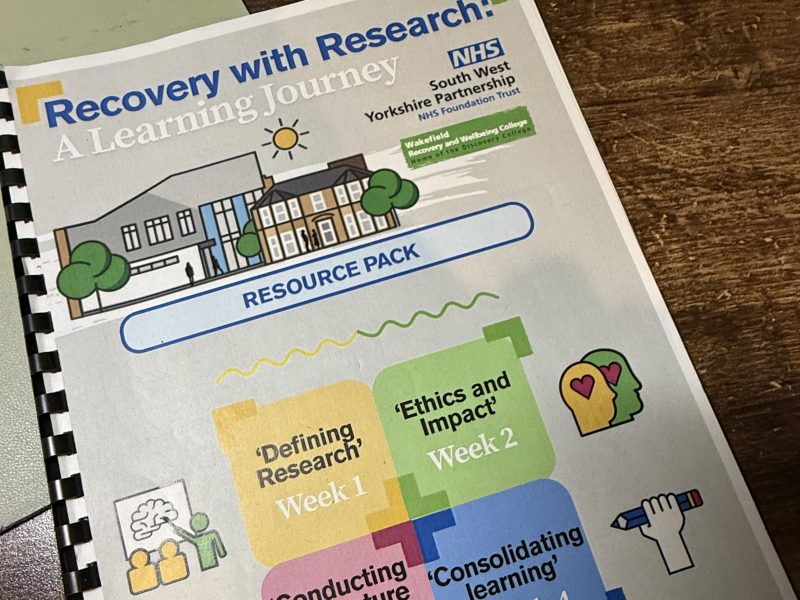
- Recap
My name is India, and I am a volunteer for Wakefield Recovery College. For the past year I have been working alongside Nicola and Ammara from the South West Yorkshire Partnership NHS Foundation Trust Research and Development Team on a project that has now evolved into a series of workshops known as ‘Recovery with Research: A Learning Journey’.
To find out the personal connection I have to this project, if you missed it, read my previous article here. To quickly recap, the purpose of the NEW workshop series ‘Recovery with Research: A Learning Journey’ is to bring together lived experience and academic expertise. Co-producing this project has been an incredible collaborative opportunity to share with the community my passion for research, and inform them of just how important and impactful research can be in healthcare and in their own lives.
- The Beta Testing Phase
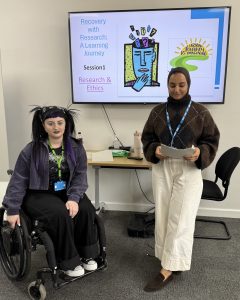
We recently entered a new phase of the project – beta testing the workshops before the final rollout. Before finalising the materials, we decided to run a series of beta workshops to explore how well the content translated into practice. This stage allowed us to observe how attendees engaged with the material, identify gaps in understanding, and gather feedback on both structure and delivery.
Ammara and I co-facilitated four in-person beta workshops, condensed into two sessions – session 1 featuring week 1 and 2 content and session 2 including week 3 and 4. To gain a range of perspectives, we invited attendees including SWYFT student researchers and R&D volunteers.
- Workshop Overview
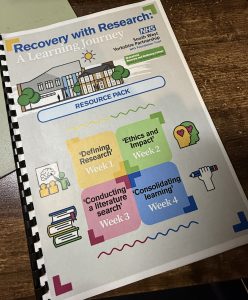
Following several months of collaborative material design, the goal of the beta test workshops was to gain feedback in a real life setting with real scenarios to shape our vision – while earlier phases focused on shaping content and identifying key priorities.
The sessions followed a consistent structure: an introduction to the research aims, a collaborative exploration of case studies, and a reflective discussion on co-production in practice. We did this by formatting the workshops to include talks, discussions, demonstrations, games, videos, brainstorming and research activities. Activities were designed to balance structured input with open dialogue, encouraging participants to share experiences and challenge assumptions.
Attendees were provided with a learning resource pack that I had spent time creating during the earlier co-production phase, and a feedback form that they could access via a QR code. These materials were central to the beta test, allowing us to assess their clarity, tone, and usability across different audiences.
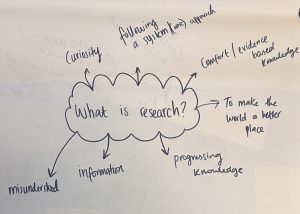
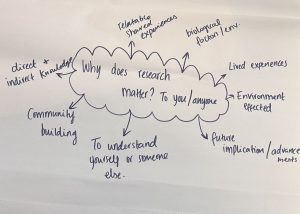
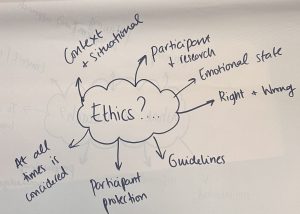
- Attendee Feedback
Although a small sample of attendee feedback was collected, we obtained an overwhelmingly positive response. Five out of six attendees said they would be interested in attending the 4-week series of workshops based on the condensed beta workshops we carried out.
One attendee shared, “I thought they (the activities) were very clearly explained and very engaging. Made me eager and open up to more conversations to a greater depth”.
Another attendee said, “I appreciated the supportive and inclusive environment created by the facilitators”.
We also received some constructive criticism around Activity 4. Activity 4 is one of the longer, more complex tasks we included in the workshops focusing on conducting your own study (for fun) but was not supposed to overwhelm the attendees. However, the feedback we received suggests that we, as facilitators, could communicate better with the attendees about the practicalities of carrying out this activity and how it might translate into the real world e.g. opportunities to be a study participant or research through the lens of lived experience.
- Next Steps
Following the workshops, I met with Nicola and Ammara to discuss the feedback we had received. With this feedback we have made revisions to the content of Week’s 3 and 4 of the full 4-week workshop, to improve the communication with regards to Activity 4 and enhance the interactivity of the workshops. I am also in the process of making further revisions to the resource pack to accurately reflect the content of the workshop in order to support the attendees.
- Conclusion
Conducting the beta workshops was an essential step in ensuring that our co-produced materials are both robust and relevant. We look forward to continuing to work with our attendees as the workshops evolve – and to sharing the final resources with others who are exploring collaborative approaches to research and engagement.
The insights gathered from attendees will directly shape the final version of the workshops, ensuring they remain grounded in lived experience and collective knowledge. Most importantly, this stage reaffirmed that co-production is a continuous process – one built on openness, feedback, and shared learning.
Popular articles
It’s launch day!
We’ve been working so hard behind the scenes over the last few…
A week in the life of…Emily
Hello! I am Emily one of the Recovery College Coordinators. No two…
Hearing Voices – not just a mental health condition
The experience of hearing voices that other people do not is more…

